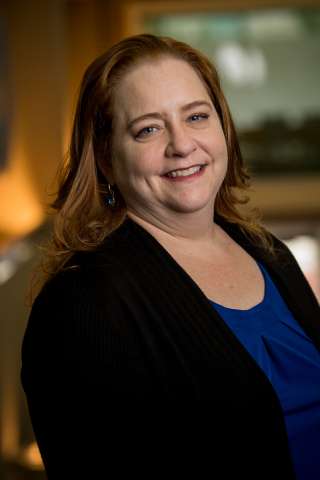
Improving Public Health by Helping the Helpers: Q&A with Bloomberg Fellow Kelly Burke
January 28, 2021
Kelly Burke says she’s long felt a calling to support those people considered the helpers in society. “Whereas some people are driven to become a doctor or a firefighter or police officer,” she says, “I see myself as a helper of helpers.”
Following this urge, she took a job after college at the Center for Missing and Exploited Children. For the next nine years, Kelly helped law enforcement both in the U.S and internationally to investigate crimes against children. Her work involved being part of several key initiatives, such as creating a cyber tip line to help protect against sex exploitation of children online and taking part in a global campaign against child sex exploitation with colleagues in Europe and Interpol.
Since 2011, Kelly has worked with the International Association of Chiefs of Police. Her projects have largely continued to focus on children and youth, including developing best practices on how law enforcement can efficiently respond to children exposed to violence, preventing human trafficking, community-based violence reduction, and improving police response to vulnerable populations.
We spoke with Kelly about her passion for improving public health through training and assisting law enforcement.
What drives you, and how did this bring you to your interest in public health?
Impact drives me! I want to contribute meaningfully to making the world a better place. Throughout my career, I have been drawn to addressing violence, including the sexual exploitation of children, children exposed to violence, and human trafficking. The central theme throughout my career progression has been building the capacity of law enforcement to effectively address challenges that lead to successful outcomes for public safety. I now understand the strong connection between public safety and public health. Individuals cannot be healthy if they do not feel safe and communities cannot be healthy if they are plagued by violence.
What public-health related work have you done that you’re most proud of?
Over the course of five years, working closely with Yale and the New Haven and Charlotte-Mecklenburg Police Departments, I learned the key role police officers can play in the lives of children and families exposed to violence and how officers can utilize trauma-informed practices to help initiate recovery and change the negative long-term trajectory of those who have experienced violence. By culling the knowledge and experience of these partners, I contributed to crafting the award-winning Enhancing Police Responses to Children Exposed to Violence: A Toolkit for Law Enforcement, which provides 13 practical tools and resources to assist law enforcement in building or enhancing effective operational responses to children exposed to violence.
What question or problem in your community keeps you up at night?
How can children be healthy if they do not feel safe from violence? Children’s exposure to violence in their homes, schools, and communities, and the resulting effects on their development that so often follows, constitute a public health crisis. When children exposed to violence are not identified and supported in recovery from traumatic stress, they are at much greater risk for long term, negative consequences, including significant health challenges and repeated victimization from, and perpetration of, sexual, physical, and interpersonal violence.
How is the Bloomberg Fellows Program helping you to tackle that problem? What impact do you hope you to make as a Bloomberg Fellow?
For more than 20 years, I have supported law enforcement practitioners in addressing urgent and complex violent crimes. Now, as a Bloomberg Fellow at Hopkins, I can build upon this experience with specific academic knowledge, tools, and a network that will enable me to strengthen my work in designing, developing, and delivering training, technical assistance, tools, and resources for law enforcement and their multidisciplinary partners to effectively address violence in their communities. The Bloomberg Fellowship has afforded me the opportunity to study in the field of public health to deepen my understanding, build knowledge, gain valuable research experience, and practice new tools to influence strategies, policies, and practices in law enforcement. The impact I hope to have is to positively influence policing practices across the country in my leadership role at the International Association of Chiefs of Police (IACP).
Connect With Us
Receive all the latest news from the Initiative by signing up for the American Health Dispatch newsletter, subscribing to the American Health Podcast, and subscribing to our YouTube channel.
Contact Us